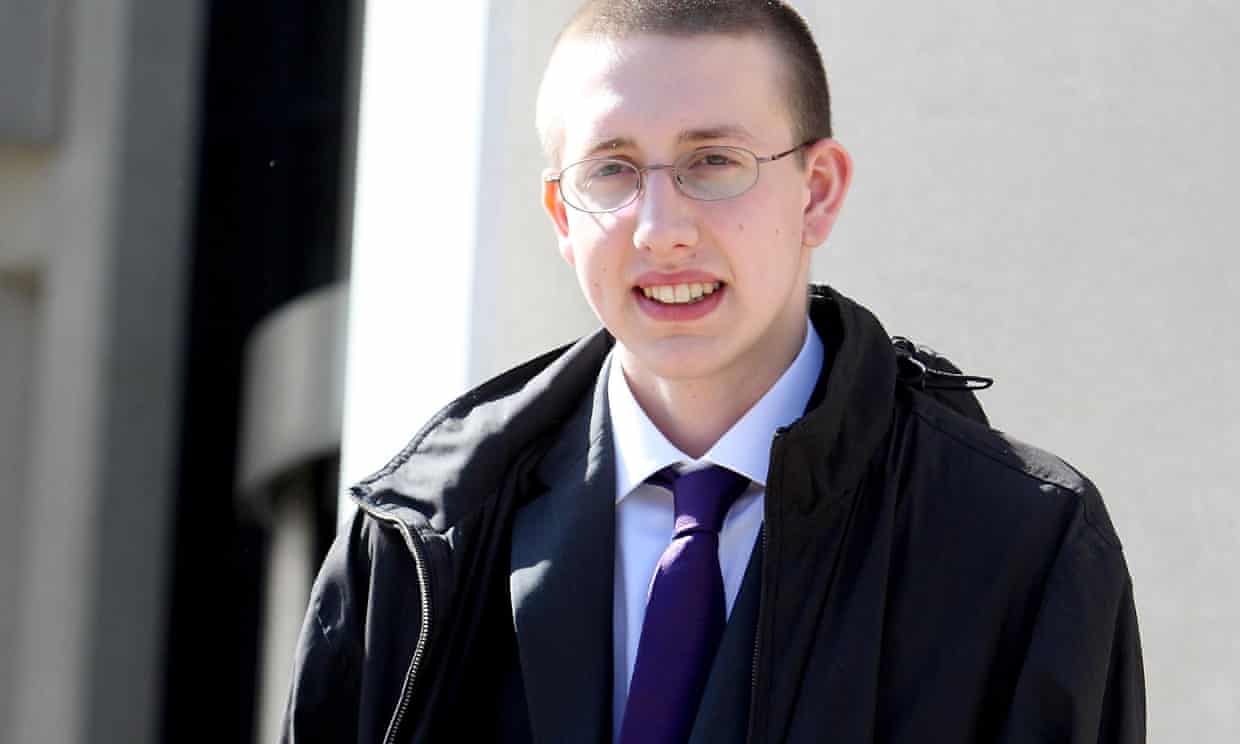
Former student tells hearing of 'excruciating pain' at hands of police
by Aamna MohdinAlfie Meadows had more than 100 staples in head after being hit by baton at 2010 protest
Alfie Meadows spoke of the “excruciating pain” he felt after being hit with a police baton during a student protest in 2010 that resulted in a brain injury requiring emergency surgery, a hearing has been told.
Meadows, then a 20-year-old philosophy student at Middlesex University, was among more than 10,000 people demonstrating against the rise in student fees in London on 9 December 2010.
Det Con Mark Alston is accused of using unreasonable force against Meadows, who needed more than 100 staples in his head and was left with a large scar. Alston is facing a misconduct hearing in central London accused of using unreasonable force.
Video footage shown at the hearing appeared to capture the moment Alston and another unknown officer raised their baton and bringing it down. During his testimony, Meadows said a police officer was “thrashing his baton around” before striking him.
“The baton swung from high to low. It was coming straight towards my head. I instinctively span around because I thought I was about to be hit by the baton and as soon as I span around I was struck by the baton,” he told the hearing. “I was struck on the top right of my head and it was incredibly hard and painful. I saw flashing lights and it was the most painful thing I have ever experienced.
He added: “I put my hand to my head. I was in excruciating pain.”
Meadows told the hearing: “I then remember hearing someone to my left crying out ‘please stop’: it sounded like he’d been struck as well.” He added: “I was in huge amounts of pain. I was very concerned for my health and I wanted to get away from the police as quickly as possible.”
Alston, then of PC rank, was deployed to police the protest, which turned violent in and around Parliament Square.
After the protest, Meadows was charged with causing violent disorder and taken to court, where he was cleared by a jury in 2013.
An investigation by the police watchdog, now called the Independent Office for Police Conduct (IOPC), found Alston had a case to answer for gross misconduct but City of London police rejected the recommendation.
The force failed in a court bid to challenge the IOPC’s direction that he should face a full hearing and Alston appeared in front of a disciplinary panel on Wednesday.
A response to the allegations submitted on Alston’s behalf said: “The officer accepts he wielded his baton, but denies that it was in a violent, uncontrolled and dangerous manner or was in any way disproportionate in light of the circumstances in which he was operating. The officer denies hitting Mr Meadows, or anyone, on the head with it.”
Meadows told the hearing that after he was struck, he pushed people out of the way and it took him a while to get through the crowd. “I took my mask off and touched my head and felt blood to my head. I felt confused and worried.”
When Meadows first went to see a medic stationed beside an ambulance, he thought he was fine. But soon after walking away, a pain started to spread to the right side of his face, the hearing was told.
He rang his mum, who met him at Buckingham Palace entrance. “I told her my head was starting to feel worse and I was in a lot of pain,” Meadows said. “We saw the medic and they said they’d take us to the hospital. I was in the ambulance with my mum and my medic; during the journey my speech began to slur. By the time we got to the hospital, my condition was deteriorating.”
When he arrived at the hospital, he said he felt sick and threw up. He had a brain scan and was then rushed to surgery. Meadows said he spent a week in hospital and spent seven months recovering at home. He was forced to delay his studies, he added.
The hearing was also told senior officers were concerned about the safety of their colleagues during the protest. Insp Stuart Phillips, who was the inspector leading the police support union, said the risk of serious injury was “extremely high” at the protest.
He told the hearing: “I’ve got quite a lot of experience in dealing with public order … this was one of the most serious incidents that took place on their streets of London
“The fact it was a targeted attack on police, it really felt more personal. Protesters were targeting the police rather than buildings or other institutions.”
The hearing continues.